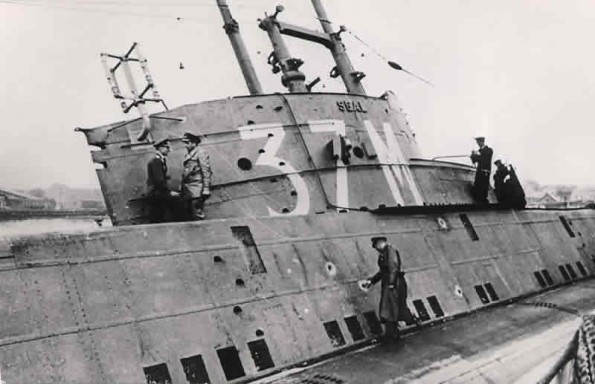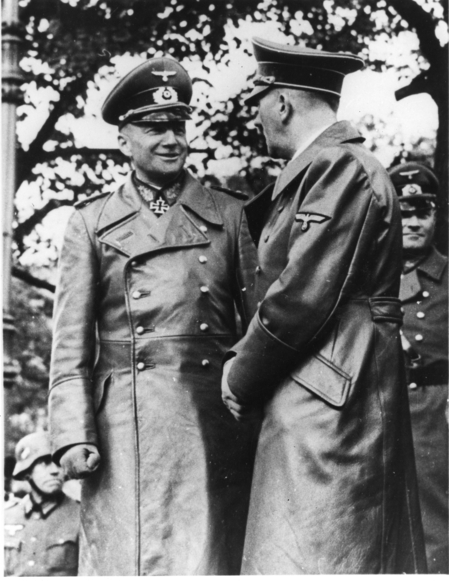Sunday 5 May 1940
 |
| HMS Seal after its capture in Kiel. |
Norwegian Foreign Minister Professor Koht, and Minister of Defence Col. Ljungberg arrive in London for consultations with British ministers. A Norwegian Government-in-exile is established in London, though the seat of government remains under British/French protection in northern Norway.
Meanwhile, Adolf Hitler has everyone else looking above the Arctic Circle - and he is looking much closer to home.
Norway Army Operations: With food running out and only enough water for a few days, the garrison of Hegra Fortress (26 miles east of Trondheim) knows that its only hope would be relief by external Norwegian/Allied troops. However, there are no longer any potential saviors within a thousand kilometers due to the British/French evacuations and Norwegian surrenders. In fact, Hegra Fortress is the last pocket of resistance south of Nordland. Accordingly, at 05:00, Major Holtermann gives a speech thanking the volunteers - largely local gun club members - and a rendition of the Norwegian national anthem. At 05:25, he raises the white flag over Hegra Fortress. The Germans, led by Hauptmann Giebel, arrive at 06:30. The garrison, totaling 190 men and one woman (nurse Anne Margrethe Bang) is led out later in the day.
Adolf Hitler ultimately orders the Hegra Fortress prisoners' release in recognition of their valor, but not before they are forced to attempt to build a road to replace the bridges that they had blown. Total casualties at Hegra Fortress:
Norwegians:
- Killed 6
- Wounded 14
- 150-200 casualties.
The Allied troops near Narvik begin consolidating their positions. Norwegian 6th Infantry Brigade and 7th Infantry Brigade and French 27th Demi-Brigade de Chasseurs capture Elvenes just north of Narvik
Norwegian Air Operations: German aircraft from Norwegian bases fly support missions for General Dietl's troops at Narvik for the first time.
Norway Naval Operations: French Foreign Legionnaires and Polish troops land at Harstad and Tromso, preparing the way for a pincer movement on Narvik. They also can help block any relief attempts.
British submarine HMS Seal begins the day on the ocean floor in the Skagerrak after a mine explodes nearby. The Captain reads the Lord's Prayer to the crew. While damaged, it is intact enough for the men to somehow re-float it (using their very last, unexpected source of air) at 01:30. They head for Swedish waters to be interned, but the submarine can only go in reverse, and then the engine seizes up completely from mud collected on the sea bottom. A Luftwaffe Heinkel He 115 seaplane and two Arado 196s spot her dead in the water at 02:30. The crew surrenders using a white table cloth.
The captain of the Seal, Rupert Lonsdale, swims to the Heinkel to surrender. The crew is saved and HMS Seal (expected by its crew to sink) is taken in tow by the German "UJ 128" (Unterseebootsjäger 128) and brought to the German naval base at Frederikshavn, Denmark. It is about as near-death as a submarine crew can get and still survive - they truly looked death in the face -and one of the epic survival stories of submarine history.
Battle of the Atlantic: German raider Widder leaves Kiel bound for Bergen.
Convoy OG 28 forms at Gibraltar.
British light cruiser HMS Fiji (Captain William G. Benn) is commissioned.
Western Front: The front remains remarkably quiet. There is a report that, during the night, German patrols launched exploratory attacks on three Allied outposts supported by artillery fire, but were driven off.
Journalist William Shirer in Berlin, unlike the Allied intelligence services, notices something unusual going on: "More bans on private cars. Why is Germany saving oil? Do they need it for some big military plan?"
Spies: Ireland is defiantly neutral, but a large body of opinion sees the distraction of war against Germany as a handy way to pry the British out of the country. Taking advantage of this, the German military intelligence service sends Kapitän Hermann Goertz to Dublin by parachute. He is there to establish contacts with the IRA and sympathetic Irish Army Officers.
Australia: Troop convoy US 3 departs Victoria, bound for Egypt. It is transporting the Australian 18th Infantry Brigade.
Vatican: Pope, Pius XII issues a public anti-war prayer: "Christ, please stop the whirlwind of death which is crushing humanity."
French Homefront: RC Paris defeats Olympique de Marseille 2-1 in the Coupe de France Final.
Future History: Lance Henriksen is born in New York City. He becomes famous as an actor in the 1970s for such films as "Dog Day Afternoon," "Close Encounters of the Third Kind," "Damien: Omen II" and, in the 1980s, "The Terminator" and "Aliens." He remains a working actor as of this writing.
 |
| Hauptmann Giebel enters Hegra Fortress to accept the Norwegian surrender, 5 May 1940. |
May 1940
May 1, 1940: British Leave ÅndalsnesMay 2, 1940: British Depart Namsos
May 3, 1940: Many Norwegians Surrendering
May 4, 1940: Bader Returns
May 5, 1940: HMS Seal Survives
May 6, 1940: Allies Focus on Narvik
May 7, 1940: In The Name of God, Go!
May 8, 1940: Exit Chamberlain
May 9, 1940: Enter Churchill
May 10, 1940: Fall Gelb
May 11, 1940: Eben Emael Surrenders
May 12, 1940: Germans at Sedan
May 13, 1940: Rommel at Work
May 14, 1940: German Breakout in France
May 15, 1940: Holland Surrenders
May 16, 1940: Dash to the Channel
May 17, 1940: Germans Take Brussels
May 18, 1940: Germans Take Antwerp
May 19, 1940: Failed French Counterattack
May 20, 1940: Panzers on the Coast
May 21, 1940: Battle of Arras
May 22, 1940: Attacking Channel Ports
May 23, 1940: British Evacuate Boulogne
May 24, 1940: Hitler's Stop Order
May 25, 1940: Belgian Defenses Creaking
May 26, 1940: Operation Dynamo
May 27, 1940: King Leopold Surrenders
May 28, 1940: The Allies Take Narvik
May 29, 1940: Lille Falls
May 30, 1940: Operation Fish
May 31, 1940: Peak Day for Dynamo
2019


